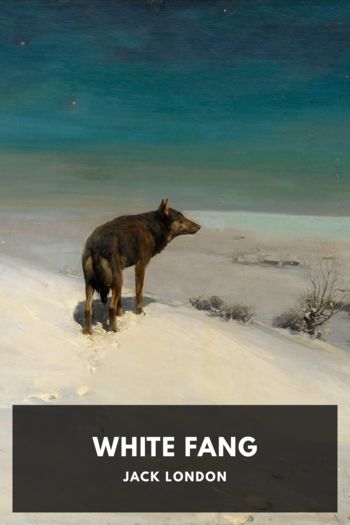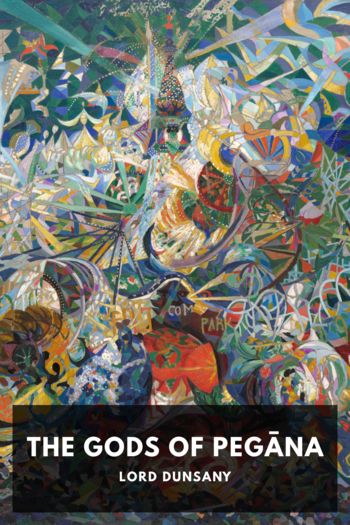White Fang - Jack London (read a book .TXT) 📗

- Author: Jack London
Book online «White Fang - Jack London (read a book .TXT) 📗». Author Jack London
All of which is neither here nor there. The men in the fort disdained the newcomers and enjoyed seeing them come to grief. Especially did they enjoy the havoc worked amongst the newcomers’ dogs by White Fang and his disreputable gang. When a steamer arrived, the men of the fort made it a point always to come down to the bank and see the fun. They looked forward to it with as much anticipation as did the Indian dogs, while they were not slow to appreciate the savage and crafty part played by White Fang.
But there was one man amongst them who particularly enjoyed the sport. He would come running at the first sound of a steamboat’s whistle; and when the last fight was over and White Fang and the pack had scattered, he would return slowly to the fort, his face heavy with regret. Sometimes, when a soft southland dog went down, shrieking its death-cry under the fangs of the pack, this man would be unable to contain himself, and would leap into the air and cry out with delight. And always he had a sharp and covetous eye for White Fang.
This man was called “Beauty” by the other men of the fort. No one knew his first name, and in general he was known in the country as Beauty Smith. But he was anything save a beauty. To antithesis was due his naming. He was preeminently unbeautiful. Nature had been niggardly with him. He was a small man to begin with; and upon his meagre frame was deposited an even more strikingly meagre head. Its apex might be likened to a point. In fact, in his boyhood, before he had been named Beauty by his fellows, he had been called “Pinhead.”
Backward, from the apex, his head slanted down to his neck and forward it slanted uncompromisingly to meet a low and remarkably wide forehead. Beginning here, as though regretting her parsimony, Nature had spread his features with a lavish hand. His eyes were large, and between them was the distance of two eyes. His face, in relation to the rest of him, was prodigious. In order to discover the necessary area, Nature had given him an enormous prognathous jaw. It was wide and heavy, and protruded outward and down until it seemed to rest on his chest. Possibly this appearance was due to the weariness of the slender neck, unable properly to support so great a burden.
This jaw gave the impression of ferocious determination. But something lacked. Perhaps it was from excess. Perhaps the jaw was too large. At any rate, it was a lie. Beauty Smith was known far and wide as the weakest of weak-kneed and snivelling cowards. To complete his description, his teeth were large and yellow, while the two eyeteeth, larger than their fellows, showed under his lean lips like fangs. His eyes were yellow and muddy, as though Nature had run short on pigments and squeezed together the dregs of all her tubes. It was the same with his hair, sparse and irregular of growth, muddy-yellow and dirty-yellow, rising on his head and sprouting out of his face in unexpected tufts and bunches, in appearance like clumped and windblown grain.
In short, Beauty Smith was a monstrosity, and the blame of it lay elsewhere. He was not responsible. The clay of him had been so moulded in the making. He did the cooking for the other men in the fort, the dish-washing and the drudgery. They did not despise him. Rather did they tolerate him in a broad human way, as one tolerates any creature evilly treated in the making. Also, they feared him. His cowardly rages made them dread a shot in the back or poison in their coffee. But somebody had to do the cooking, and whatever else his shortcomings, Beauty Smith could cook.
This was the man that looked at White Fang, delighted in his ferocious prowess, and desired to possess him. He made overtures to White Fang from the first. White Fang began by ignoring him. Later on, when the overtures became more insistent, White Fang bristled and bared his teeth and backed away. He did not like the man. The feel of him was bad. He sensed the evil in him, and feared the extended hand and the attempts at soft-spoken speech. Because of all this, he hated the man.
With the simpler creatures, good and bad are things simply understood. The good stands for all things that bring easement and satisfaction and surcease from pain. Therefore, the good is liked. The bad stands for all things that are fraught with discomfort, menace, and hurt, and is hated accordingly. White Fang’s feel of Beauty Smith was bad. From the man’s distorted body and twisted mind, in occult ways, like mists rising from malarial marshes, came emanations of the unhealth within. Not by reasoning, not by the five senses alone, but by other and remoter and uncharted senses, came the feeling to White Fang that the man was ominous with evil, pregnant with hurtfulness, and therefore a thing bad, and wisely to be hated.
White Fang was in Grey Beaver’s camp when Beauty Smith first visited it. At the faint sound of his distant feet, before he came in sight, White Fang knew who was coming and began to bristle. He had been lying down in an abandon of comfort, but he arose quickly, and, as the man arrived, slid away in true wolf-fashion to the edge of the camp. He did not know what they said, but he could see the man and Grey Beaver talking together. Once, the man pointed at





Comments (0)